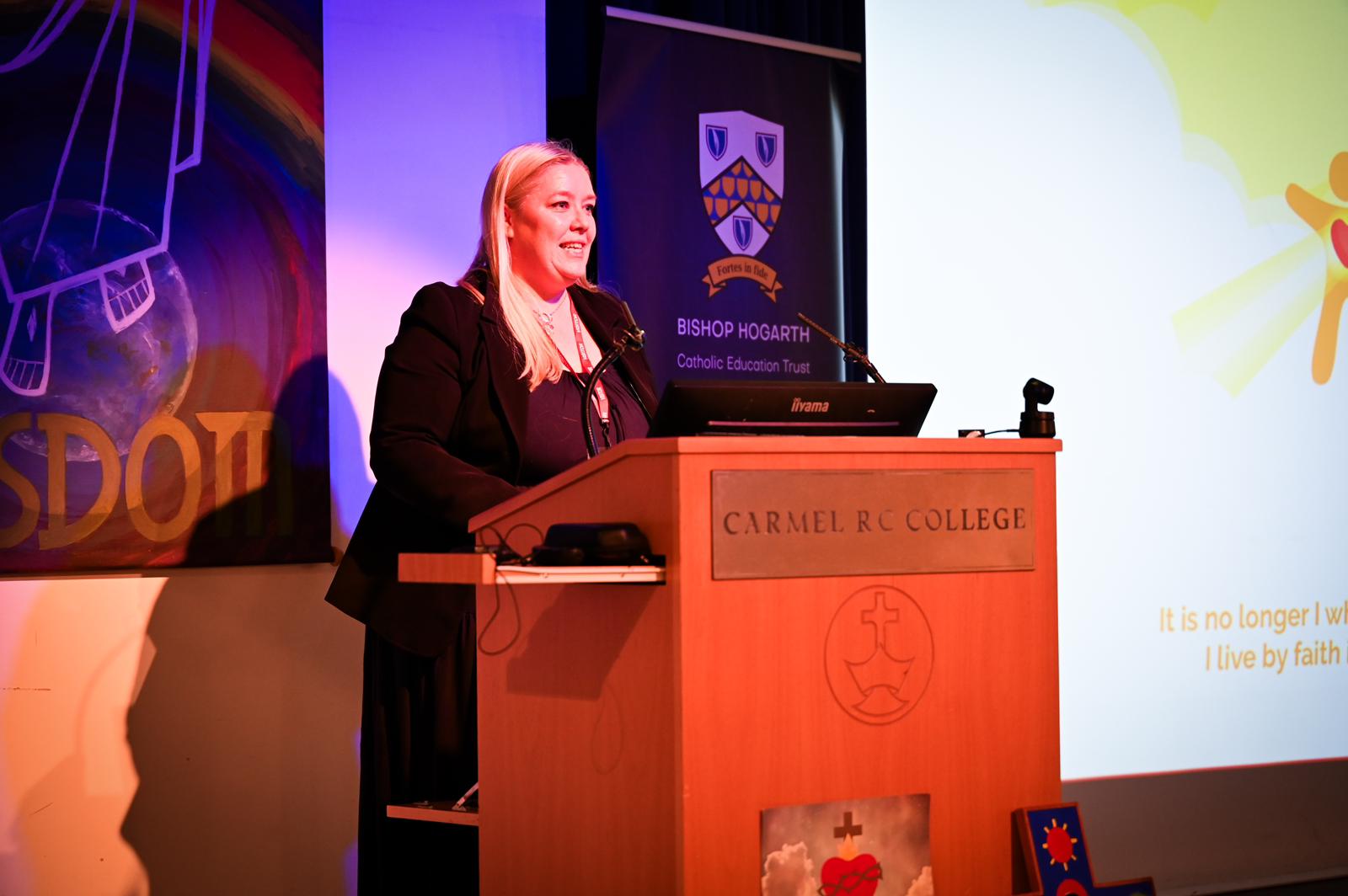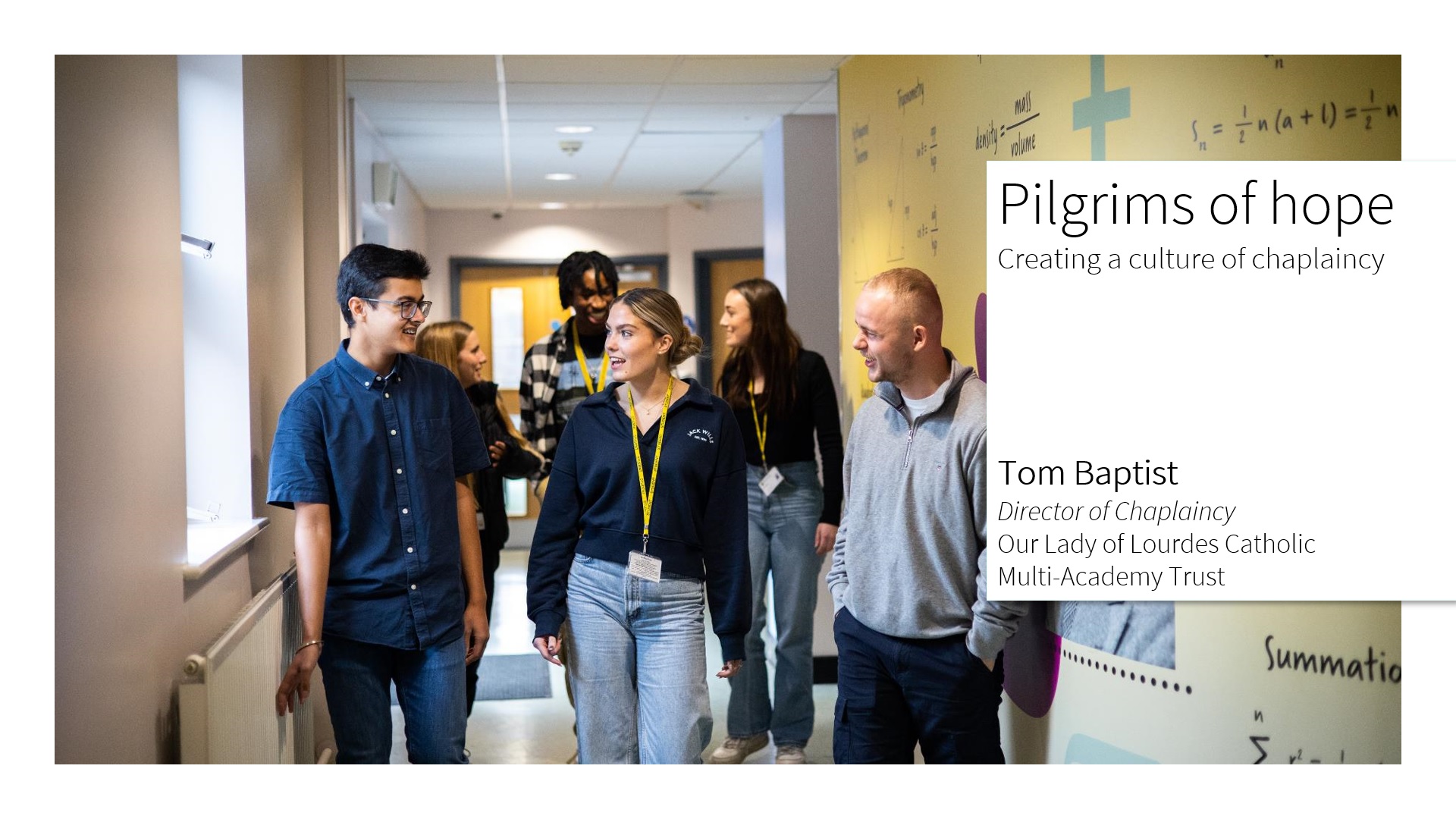UK's first Catholic mission strategy produced for Leeds Trinity University
 A consultation with Leeds Trinity University staff and students has led to the UK’s first Catholic mission strategy being produced.
A consultation with Leeds Trinity University staff and students has led to the UK’s first Catholic mission strategy being produced.
This has been welcomed by staff, students and governors at Leeds Trinity, which is one of four Catholic universities in England.
Consultation and open psychologically safe listening revealed that some staff and students did not fully understand the Catholic nature of the university and how it can be expressed in a competitive higher education marketplace.
The inspiring story of the Sisters of the Cross and Passion and CES, who opened the university in 1966 to widen access to education and skills for marginalised groups in society, was the catalyst for a renewed understanding of why the Catholic mission of the university can and should continue to be articulated.
The story of The Most Venerable Elizabeth Prout also inspired the Leeds Trinity community to see themselves in the story of the foundress of the Sisters of the Cross and Passion order — and as part of the continuation of her mission to provide education for all.
Dr Ann Marie Mealey (pictured), the university’s Director of Catholic Mission, said: “The founding vision of transformation of lives through education informed by faith still resonates on campus today, including with non-Catholics. We always need to find new ways of aligning our Catholic mission with sector demands because Catholic education has always made a significant contribution to ‘teaching from the margins of society’ with faith and love. And this is still credible in today’s world.
“I am so proud of the Leeds Trinity staff and student community. They found our foundational story and raison d’être so inspiring once it was explained to everyone that each and every person is a part of a mission to offer education as hope for a better future for everyone. Our motto of education for hope is used positively by many staff and students and is a sign of renewed engagement with who we always were since 1966.”
The university reaffirmed its mission inspired by the guidance of the Sisters of the Cross and Passion as follows:
- learn respect for self and others
- learn the meaning of an inclusive community which celebrates difference and acknowledges mutual interdependence
- develop a love of learning and appreciation of their talents
- read the signs of the times and respond to the crying needs of the world today
- share their gifts and resources in a spirit of compassion for the building of a more just world
The strategy includes an emphasis on providing skills outside of the classroom to students in ethical leadership programmes and workshops, inspired by the principles of Catholic Social Teaching. It also capitalises on the global network of Catholic higher education, of which England’s four Catholic universities are a part.
The strategic pillars of the new strategy align with Leeds Trinity’s strategic plan and demonstrate how each and every person is invited to develop their full potential. This is achieved through sustainable education; ethically informed student experience; support for Catholic multi-academy trusts; research and knowledge exchange; as well as in international and national collaborations with sister Catholic schools, colleges and universities that make up the Catholic family of education providers.
Leeds Trinity’s recent Catholic mission work has branched out into areas including Beyond The Dark Clouds, a free online lecture series and internationally-known podcast on Catholic approaches to topical issues; an annual conference on Catholic education; designing an ethical leadership programme in association with CAFOD; and hosting a mosaic of Biblical scenes by an award-winning artist at the university’s chapel.
Part of the mosaic depicted Alan Kurdi, the two-year-old boy washed up on a beach in Turkey while crossing the Mediterranean from Syria. Dr Mealey said that non-Catholic staff and students visiting the exhibition were impressed to hear of the Bishops’ approach to migration, as articulated in Love The Stranger.
She said: “Some staff and students said they didn’t know that the Bishops engaged with the ethical challenges of our times. But being guided to learn more about the intellectual side of the Church helped those who are not Catholic to come forward and speak about our university’s Catholicism in a positive light and to understand more fully that the social teachings of the Church invite everyone to consider what is deeply human about education and human living.
“I’m so grateful to everyone for their contributions and engagement in this process and hope that our work inspires other universities to design their own strategies for hope.”
Find out more about Leeds Trinity University’s Catholic mission
Formatio Teaching Internship Programme: grow your own trainee teachers
 The Formatio partnership supports the Catholic Education Service and diocesan schools commissions in implementing strategies for school leadership and governance, as commissioned by the Bishops in 2017.
The Formatio partnership supports the Catholic Education Service and diocesan schools commissions in implementing strategies for school leadership and governance, as commissioned by the Bishops in 2017.
Its strategic priorities are teacher recruitment, particularly in Religious Education, as well as developing Catholic leadership and the training of multi-academy trust (MAT) staff.
Formatio is made up of four regional hubs comprising partnerships of the dioceses, MATs and the four Catholic universities.
Formatio's South West Regional Hub has identified the need to recruit excellent candidates into Catholic schools both to ensure exceptional Catholic education for children and to grow a rich source of future Catholic leaders.
This led to encouraging and enthusing current students to explore teaching as a career and consider the benefits of working in Catholic schools. The Teaching Internship Programme provides two main resources.
The first is the Be the Difference video, which you can stream to watch at the bottom of this page. It captures the experience of students and staff in three Catholic schools from across the Southwest Partnership.
Pupils from year 3 to year 11 explain what makes their school special and teachers from all phases speak passionately about their experience of teaching in Catholic schools. This includes a four-minute taster version of short soundbites, and a 13-minute version of more in-depth interviews. Both are included in the Year 12 programme but could be used independently for Catholic teacher recruitment purposes.
The second resource is a sample strategy with written resources for schools and colleges to follow together with supporting materials. This resource has been produced in text with few photographs and without any branding, to enable staff to download and add their school’s own templates, stories, images and local context.
These two resources are intended to encourage more candidates into the teaching profession and raise awareness of the benefits of working in the Catholic sector. The target audiences for the video resources range from sixth form students, undergraduates, current teachers in other schools or not currently teaching and parishioners interested in a career in teaching. The written resources are linked to the sample strategy that begins with Year 12 students, although they could be adapted for use with any of those target audiences.
The resources can be downloaded below.
Southwark Archdiocese: award-winning authors at Kent Catholic Schools’ Partnership Primary Children’s Conference
 On Wednesday 5 June, after an entire year of planning and preparation, Kent Catholic Schools’ Partnership (KCSP) held our first ever children’s conference for 793 Year 5 pupils and we are so proud to say that it was one of our biggest and most successful events to date!
On Wednesday 5 June, after an entire year of planning and preparation, Kent Catholic Schools’ Partnership (KCSP) held our first ever children’s conference for 793 Year 5 pupils and we are so proud to say that it was one of our biggest and most successful events to date!
Working with Ellie and Zoe at Speaking of Books, who specialise in bringing together children with leading writers, illustrators and storytellers, we were lucky enough to have some incredibly special guests join us: author and former Children’s Laureate Michael Rosen, spoken word poet (and expert digeridoo player!) Zohab Zee Khan, bestselling and award-winning Kent-based author Lucy Strange, and award-winning illustrator Chanté Timothy.
Our guests ran a series of fun and engaging workshops for our pupils, inspiring them, teaching them some new brilliant skills and ways of writing, telling stories, and how to express themselves through spoken and written word.
Our grateful thanks go to our host schools, St John’s Catholic Primary School, and St John’s Catholic Comprehensive School, in Gravesend; they were warm and welcoming, cheerfully accommodating two giant marquees, four very special guests, 18 coaches, 118 staff, and, not to mention, 793 pupils!
Our pupils had a wonderful day that we know they will remember for a very, very long time to come, and we cannot wait to hold our next conference, so please watch this space!
Charlotte Robinson
Executive Director of Governance and Company Secretary
Kent Catholic Schools' Partnership

Pilgrims of hope - creating a culture of chaplaincy
 Many of the 2,169 Catholic schools, colleges and academies in England and Wales employ chaplains to address the social, emotional and spiritual needs of students and staff.
Many of the 2,169 Catholic schools, colleges and academies in England and Wales employ chaplains to address the social, emotional and spiritual needs of students and staff.
However, a lack of career progression and limited pay can result in low numbers of applicants for school chaplaincy vacancies, with chaplains stretched between multiple sites, and who then move on to jobs with better prospects.
Tom Baptist is Director of Chaplaincy at Our Lady of Lourdes Catholic Multi-Academy Trust. In collaboration with the Diocese of Nottingham Education Service, he has highlighted and addressed this issue by establishing a career pathway from apprentice level up to a regional chaplaincy director.
Within this innovative structure a lay chaplain support staff post has been created to avoid teaching assistants taking on pastoral duties beyond their role.
This new post provides formal recognition for their work, an improved salary, and potential career progression into school chaplaincy.
The school chaplains are supported by the education structure in Nottingham Diocese, with all 84 of its state-funded Catholic schools within three multi-academy trusts (MATs).
Consistent pay and conditions are ensured by the diocesan Human Resources Director who oversees all three MATs.
Further detail is available within the presentation downloadable below, which has been kindly provided by Tom.

